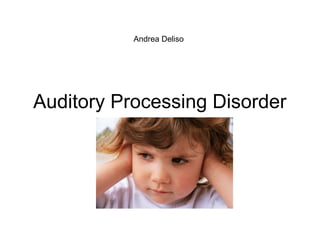
Auditory processing disorder (3)
- 1. Auditory Processing Disorder Andrea Deliso
- 2. What is auditory processing? • term used to describe what happens when your brain recognizes and interprets the sounds around you.
- 3. Auditory Processing Disorder • The "disorder" part of auditory processing disorder means that something is adversely affecting the processing or interpretation of the information.
- 4. APD • central auditory processing disorder (CAPD). • auditory perception problem, • auditory comprehension deficit, • central auditory dysfunction, • central deafness, • "word deafness."
- 5. • We are not sure! • The many possible causes of APD include head trauma, lead poisoning, and chronic ear infections. Sometimes the cause is unknown. Because there are many different possibilities — even combinations of causes — each child must be assessed individually. What causes auditory processing difficulty?
- 6. What are the symptoms of possible auditory processing difficulty? • Have trouble paying attention to and remembering information presented orally • Have problems carrying out multistep directions • Have poor listening skills • Need more time to process information • Have low academic performance • Have behavior problems • Have language difficulty (e.g., they confuse syllable sequences and have problems developing vocabulary and understanding language) • Have difficulty with reading, comprehension, spelling, and vocabulary
- 7. How is suspected auditory processing difficulty diagnosed in children? • Teacher: may be the first person to notice symptoms of auditory processing difficulty. There may need to be ongoing observation. • Initially it is important to rule out other problems. • An audiologic evaluation is necessary. • A speech-language pathologist can find out how well a person understands and uses language. • A mental health professional can give you information about cognitive and behavioral challenges that may contribute to problems • Because the audiologist can help with the functional problems of hearing and processing, and the speech-language pathologist is focused on language, they may work as a team
- 8. Detecting APD • Children with APD are thought to hear normally. • Most kids with APD do not have a loss of hearing sensitivity, but have a hearing problem in the sense that they do not process auditory information normally. • If the auditory deficits aren't identified and managed early, many of these kids will have speech and language delays and academic problems.
- 9. Symptoms • Symptoms can range from mild to severe and can take many different forms. If you think a child might have a problem with how he or she processes sounds, consider these questions: ~ Is the child easily distracted or unusually bothered by loud or sudden noises? ~ Are noisy environments upsetting to the child? ~Does the child's behavior and performance improve in quieter settings? ~Does the child have difficulty following directions, whether simple or complicated? ~Does the child have reading, spelling, writing, or other speech- language difficulties? ~Is abstract information difficult for the child to comprehend? ~ Are verbal (word) math problems difficult for the child? ~Is the child disorganized and forgetful? ~Are conversations hard for the child to follow?
- 10. APD Behaviors • APD is an often misunderstood problem because many of the behaviors can also appear in other conditions such as: • learning disabilities, • attention deficit hyperactivity disorder (ADHD), • and even depression. • Although APD is often confused with ADHD, it is possible to have both. • It is also possible to have APD and specific language impairment or learning disabilities.
- 11. What treatments are available for auditory processing difficulty? • Several strategies are available to help children with auditory processing difficulties. Strategies you may hear about include: • Auditory trainers • Environmental modifications : ways to improve the listening environment ~ classroom acoustics, ~ placement, ~ seating Exercises to improve language-building skills can increase the ability to learn new words and increase a child's language base. • Auditory memory enhancement • informal auditory training techniques can be used by teachers and therapists to address specific difficulties. • Auditory integration training may be promoted by practitioners as a way to retrain the auditory system and decrease hearing distortion. However, current research has not proven the benefits of this treatment.
- 12. Key Points • APD is an auditory disorder that is not the result of higher- order, more global deficit such as autism, mental retardation, attention deficits, or similar impairments. • Not all learning, language, and communication deficits are due to APD. • No matter how many symptoms of APD a child has, only careful and accurate diagnosis can determine if APD is, indeed, present. • Although a multidisciplinary team approach is important in fully understanding the cluster of problems associated with APD, the diagnosis of APD can only be made by an audiologist. • Treatment of APD is highly individualized. There is no one treatment approach that is appropriate for all children with APD.